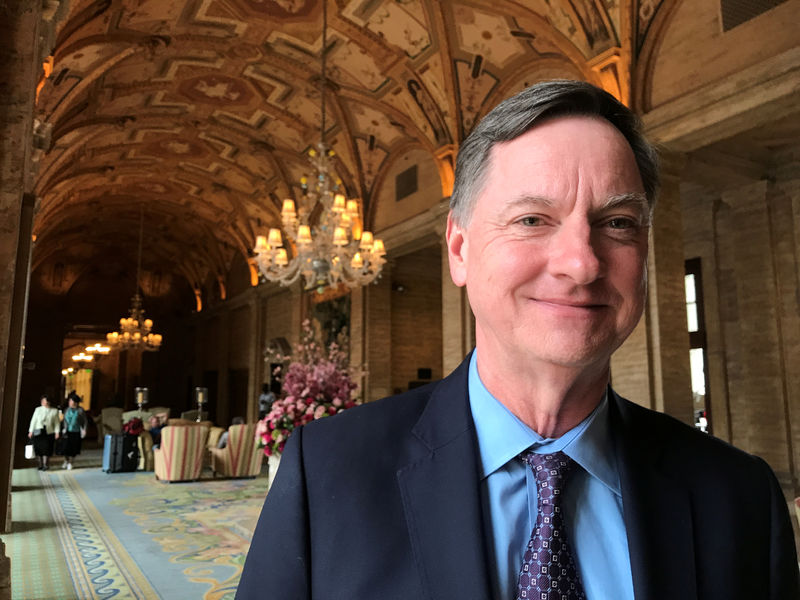 © Reuters. Charles Evans, president of the Federal Reserve Bank of Chicago, poses for a photo in Palm Beach
© Reuters. Charles Evans, president of the Federal Reserve Bank of Chicago, poses for a photo in Palm BeachRIVERWOODS, Ill. (Reuters) – The Federal Reserve can wait and use the first half of this year to assess growing risks to the otherwise solid U.S. economic outlook, an influential regional Fed president said on Wednesday, even as he stuck by an expectation to eventually raise interest rates a bit into restrictive territory.
Chicago Fed President Charles Evans has been among the most vocal backers of gradually tightening U.S. monetary policy. In his first public comments since November, he nodded to an array of “tough-to-read” factors highlighted by the recent market selloff, but penciled in a forecast for reasonably good U.S. growth and employment in 2019 and beyond.
His prepared remarks gave no hard timeline for further rate hikes but they hinted he could agree to stand pat until around mid year to see how factors like global growth and U.S. trade and fiscal policy pan out.
“If the downside risks dissipate and the fundamentals continue to be strong, I expect that eventually the fed funds rate will rise a touch above its neutral level,” he said, pointing to a policy rate between 3 and 3.25 percent.
The U.S. central bank hiked rates last month to a range of 2.25-2.5 percent, its fourth policy tightening of 2018, and policymakers’ forecasts pointed to about two more hikes this year. Since then however, volatility has held strong in financial markets worried about a pending slowdown.
“Because inflation is not showing any meaningful sign of heading above 2 percent (target)…I feel we have good capacity to wait and carefully take stock of the incoming data and other developments,” said Evans, among the longest-serving current central bankers and a voter on Fed policy this year.
“Developments in the first half of 2019 will be very important for making this assessment of our future monetary policy actions,” he added in a speech to directors and other employees at a meeting of the Discover Financial Services (NYSE:) firm.
In November Evans said raising rates to about 3.25 percent would be a “reasonable assumption.” Fed Chair Jerome Powell and other top officials in recent weeks have stressed that they are listening to the concerns implied by the stock market selloff that began in early October, and traders are very skeptical of much more tightening this year.
“A case can be made for a reasonably good 2019 economic outcome,” said Evans. “But I do not want to downplay the risks too much.”
Fusion Media or anyone involved with Fusion Media will not accept any liability for loss or damage as a result of reliance on the information including data, quotes, charts and buy/sell signals contained within this website. Please be fully informed regarding the risks and costs associated with trading the financial markets, it is one of the riskiest investment forms possible.
Source: Investing.com




























